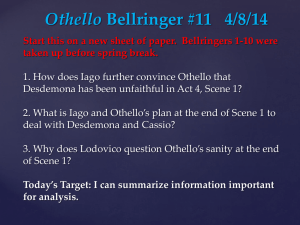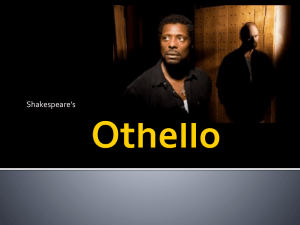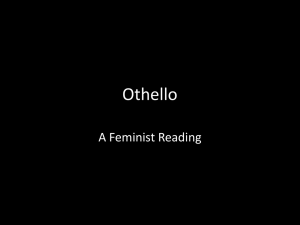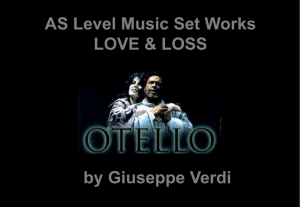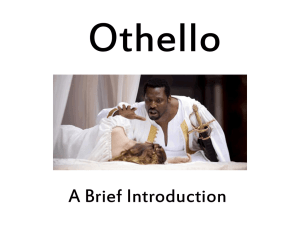Othello - Livre Or Die
advertisement
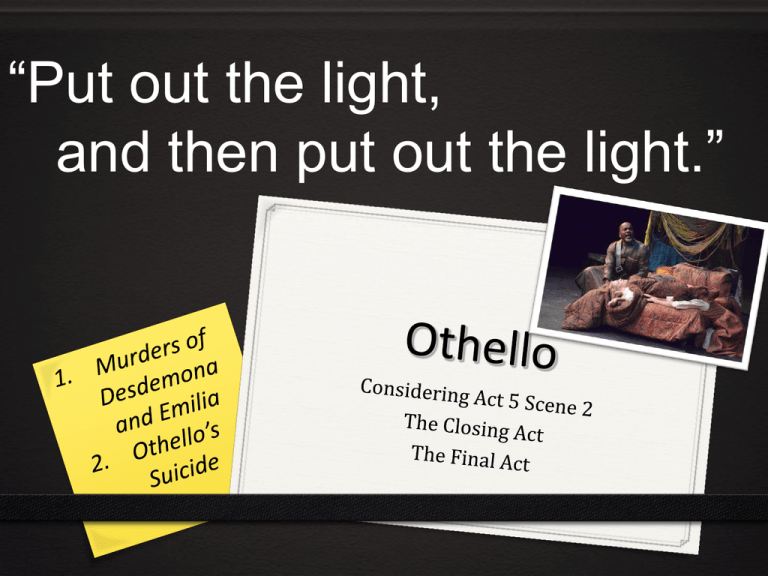
“Put out the light, and then put out the light.” Act 5 Scene 2 - Opening Stage directions are critically significant “Enter Othello, with a light, Desdemona in her bed.” Painfully ironic Darkness and Light / Ignorance and Truth Act 5 Scene 2 - Opening Setting: In most plays, the bed will be the central feature of the stage in this scene Exchange between Othello and Desdemona frustrating and painful to watch Act 5 Scene 2 - Opening Othello’s opening speech delivered whilst Desdemona is asleep Motif of light a feature of his speech Tragic irony: “Put out the light, and then put out the light.” 5.2.7 Desdemona and Othello Othello finally confronts Desdemona but he is determined to follow through with his actions – audience reminded of his absolute, unwavering and steadfast nature Intradialogical directions indicate Othello’s physical gestures and facial expressions, revealing of his emotional and mental state “..for you’re fatal then/ When your eyes roll so.” 5.2.38 “Alas, why gnaw you so your nether lip?/ Some bloody passion shakes your very frame..” 5.2.43-4 Silencing of Women Final silencing of Desdemona Despite her pleading, Othello proceeds to smother her Othello denies her last request even for a prayer Contrast Desdemona’s firm and confident voice at the beginning of the play – futility? Even Emilia, portrayed as the more worldly wise and stronger than Desdemona, is unable to stop the tragedy “Nobody – I myself – farewell.” 5.2.125 Tragic as whilst she is aware of her innocence, she remains silent in order to protect her husband – spirit of self-abnegation Continues to blame herself Othello’s Last Words “Then must you speak/ Of one that loved not wisely, but too well; Of one not easily jealous…” True? Or another act of self-deception? More apt if these words had been spoken by Desdemona – another level of silencing – female voice relegated to a male Othello’s Last Words “Where a malignant and a turbaned Turk/ Beat a Venetian and traduced the state, I took by th’throat the circumcised dog/ And smote him thus” Within Othello lies a barbaric Turk and by killing a Turk, he wants to redeem himself YET, his absolutism still remains Real tragedy (?): He dies as unenlightened Closing Line of Play Spoken by Lodovico “Myself with straight abroad, and to the state/ this heavy act with heavy heart relate” 0 rhymed couplet together with its sighing alliteration closes the play on a solemn note 0 a final reminder to the audience of Othello’s once respected, revered position as the Head of the Venetian army Othello Act 5 – Trial of the Hero? To what extent is Othello the victim, and how far is he an agent of his fate? Othello’s Suicide Consider Othello’s suicide: final and ultimate act of exclusion from society and the society at large Filled with pathos and tragic poignancy at this inability to assimilate completely into the Venetian society and as his role as a husband Othello Act 5 – Trial of the Hero? Othello Guilty Agent of own fate Not Guilty Victim Egoist Igao’s manipulation Jealousy— Self generated Natural reactions of Man under pressure Failing to admit his guilt Vulnerabilities & Insecurities in a foreign society Action— Killing Desdemona Nobility restored Lang, action Toyed by fate Othello the Egoist? Sees himself as agent of justice to society Proves to himself that he is a fair and honourable individual Blind to his own faults A victim of others’ cruelty; society’s injustice, perhaps? Othello’s Final Speech “Cheering himself up” self-soothing rhetoric – T.S. Eliot Compares Desdemona’s death to roses/light Othello is not confronting the truth but shields himself from it As an individual he appears to be selfcentered and demonstrates self-idealization… ….to compensate for his sense of weakness Othello’s Suicide Suicide INAUTHENTIC Moral cowardice Histrionic gesture Self-admiring dramatization SINCERE His drive to murder Desdemona is also a drive to kill something deep within himself He’s not condemned “rash & most unfortunate” A result of him failing to attain Real self comfort Othello’s Suicide Self-indictment so complete that it is an act of self-annihilation Because of his need for moral and emotional finality Recognition of his own desperate need for Desdemona’s love Dies upon a kiss As an individual, the act of suicide is a complete removal of one’s self from the society Justice & Discernment in Society Appalling injustice can go under the name of justice Iago to Othello Othello to Desdemona Justice & Discernment in Society Human emotions alters aspects of justic (falsify or enforce) Love and hate Desire for people, truth Fear Respect

